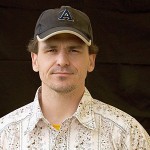Duke is hosting writer/activist Dave Eggers today and tomorrow, meaning I have his latest book to read in the few hours before Eggers speaks to a full house at Page Auditorium.
I’ve been a fan of Eggers since he started McSweeny’s, the San Francisco-based literary publishing central. To call it a publisher does a great disservice to the creative ways Eggers and his colleagues have produced material:the quarterly literary journal, Timothy McSweeney’s Quarterly Concern, the daily-updated literature and humor site McSweeney’s Internet Tendency, the monthly magazine The Believer, and the new quarterly DVD magazine, Wholphin. McSweeney’s also runs two additional imprints, Believer Books and the Collins Library.
The work I admire the most is What is the What, Eggers collaborative work with Valentino Achak Deng, a refugee from the Sudanese civil war. Having survived roving bands of killers as well as fetid refugee camps, Deng is flown to Atlanta as a refugee. The book begins as Deng, an innocent despite his experiences, is robbed in his new Atlanta apartment. What is the What is LONG, detailed and completely absorbing. Though there are a lot of details (A LOT) they add up to a kind of symphony of a life and a level of basic respect for people living in a patient, hopeful and honorable way.
That is certainly the tone of Zeitoun, which follows the Zeitoun family as Katrina approaches. Abdulrahman Zeitoun and his wife, Kathy, run a painting business in New Orleans. Zeitoun is a striver, an up-fro-your-bootstraps immigrant while Kathy, a Baton Rouge native, is a single mother who converted to Islam before even meeting her future husband. When the news turns ominous, Zeitoun and Kathy separate, her with the kids and him in the city to (he hopes) watch over their home and rental properties.
Zeitoun is in the city when the levees break, and Eggers’ spare, detailed writing only enhances the horror of what he sees:
The darkness around him was complete, the night silent but for the dogs. First a few, then dozens. From all corners of the neighborhood he heard them howling. The neighborhood was full of dogs, so he was accustomed to their barking. On any given night, one would become excited by something and set off the rest, an arrhythmic call-and-response that could last hours until they calmed, one by one, into silence. But this night was different. These dogs had been left behind, and now they knew it. There was a bewilderment, an anger in their cries that cut the night into shards.
The books reminded me powerfully of a documentary we screened last year, called Trouble the Waters. Using similar close-grained detail, the film makers followed one Ninth Ward couple as they lived through (and filmed) the hurricane, then became As chaos expands, Zeitoun is arrested as he checks on one of his houses. His Syrian origins convince the National Guard soldiers that he is Al Qaeda. Another, scarier odyssey ensues. this time in the criminal justice system.
Zeitoun is an engrossing read — the book doesn’t pretend to have all the answers to why Katrina spawned such astonishing disasters in New Orleans. But it does evoke powerfully how Zeitoun and his family experienced the storm and its aftermath, in a way I will not forget.

